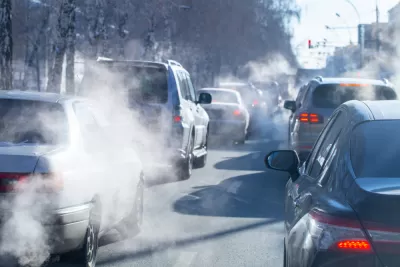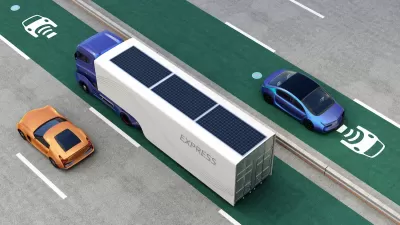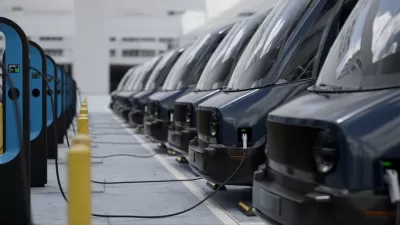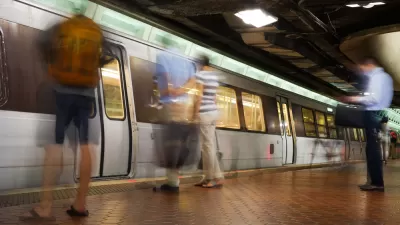The U.S. National Blueprint for Transportation Decarbonization is designed to guide federal investment and regulations, focusing on electrification with a nod to transit investment and walkability.

A ‘first of its kind’ federal plan sets out goals for cutting carbon emissions in the transportation sector, but postpones the biggest reductions to the 2030s and 2040s, according to an article by Ian Duncan in the Washington Post. “The blueprint doesn’t set out new, enforceable targets, but serves as a long-term guide for federal agencies tasked with writing climate rules and spending environmental funds,” Duncan explains.
The plan is based on three concepts: ‘convenient,’ which includes promoting more walkable communities; ‘efficient,’ including modes of transportation like buses and trains; and ‘clean,’ for fuels like batteries and hydrogen.
The plan relies on the adoption of electric vehicles for most of the reductions. As Duncan notes, “The infrastructure law included $7.5 billion for charging infrastructure, split between a network along highways that officials hope will give drivers confidence to take electric vehicles on long road trips, and a program designed to ensure that disadvantaged communities have access to chargers.” The law also includes a $7,500 electric vehicle tax credit (though it notably excludes credits for electric bikes). However, Duncan points out that “Electric vehicles accounted for less than 1 percent of miles driven in 2021 in the United States,” and the growing popularity of large trucks and SUVs is slowing any gains in emissions reduction.
Meanwhile, “many environmental advocates have urged state transportation agencies to limit the construction of new highways that tend to encourage driving, and instead invest money in alternative infrastructure, such as bus lanes and bike paths.” According to a Georgetown Climate Center study, “if money from the infrastructure law were invested in such green projects, it could contribute a further percentage point cut to emissions over the course of the decade.”
For more information, also see a U.S. Department of Transportation press release announcing the U.S. National Blueprint for Transportation Decarbonization. The blueprint is also available online at the U.S. Department of Energy website.
FULL STORY: Biden administration plan seeks elimination of transportation emissions

Planetizen Federal Action Tracker
A weekly monitor of how Trump’s orders and actions are impacting planners and planning in America.

Map: Where Senate Republicans Want to Sell Your Public Lands
For public land advocates, the Senate Republicans’ proposal to sell millions of acres of public land in the West is “the biggest fight of their careers.”

Restaurant Patios Were a Pandemic Win — Why Were They so Hard to Keep?
Social distancing requirements and changes in travel patterns prompted cities to pilot new uses for street and sidewalk space. Then it got complicated.

Platform Pilsner: Vancouver Transit Agency Releases... a Beer?
TransLink will receive a portion of every sale of the four-pack.

Toronto Weighs Cheaper Transit, Parking Hikes for Major Events
Special event rates would take effect during large festivals, sports games and concerts to ‘discourage driving, manage congestion and free up space for transit.”

Berlin to Consider Car-Free Zone Larger Than Manhattan
The area bound by the 22-mile Ringbahn would still allow 12 uses of a private automobile per year per person, and several other exemptions.
Urban Design for Planners 1: Software Tools
This six-course series explores essential urban design concepts using open source software and equips planners with the tools they need to participate fully in the urban design process.
Planning for Universal Design
Learn the tools for implementing Universal Design in planning regulations.
Heyer Gruel & Associates PA
JM Goldson LLC
Custer County Colorado
City of Camden Redevelopment Agency
City of Astoria
Transportation Research & Education Center (TREC) at Portland State University
Camden Redevelopment Agency
City of Claremont
Municipality of Princeton (NJ)





























